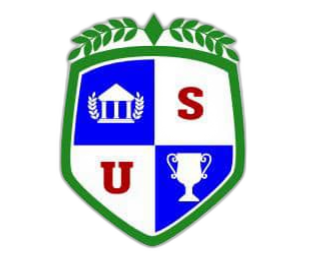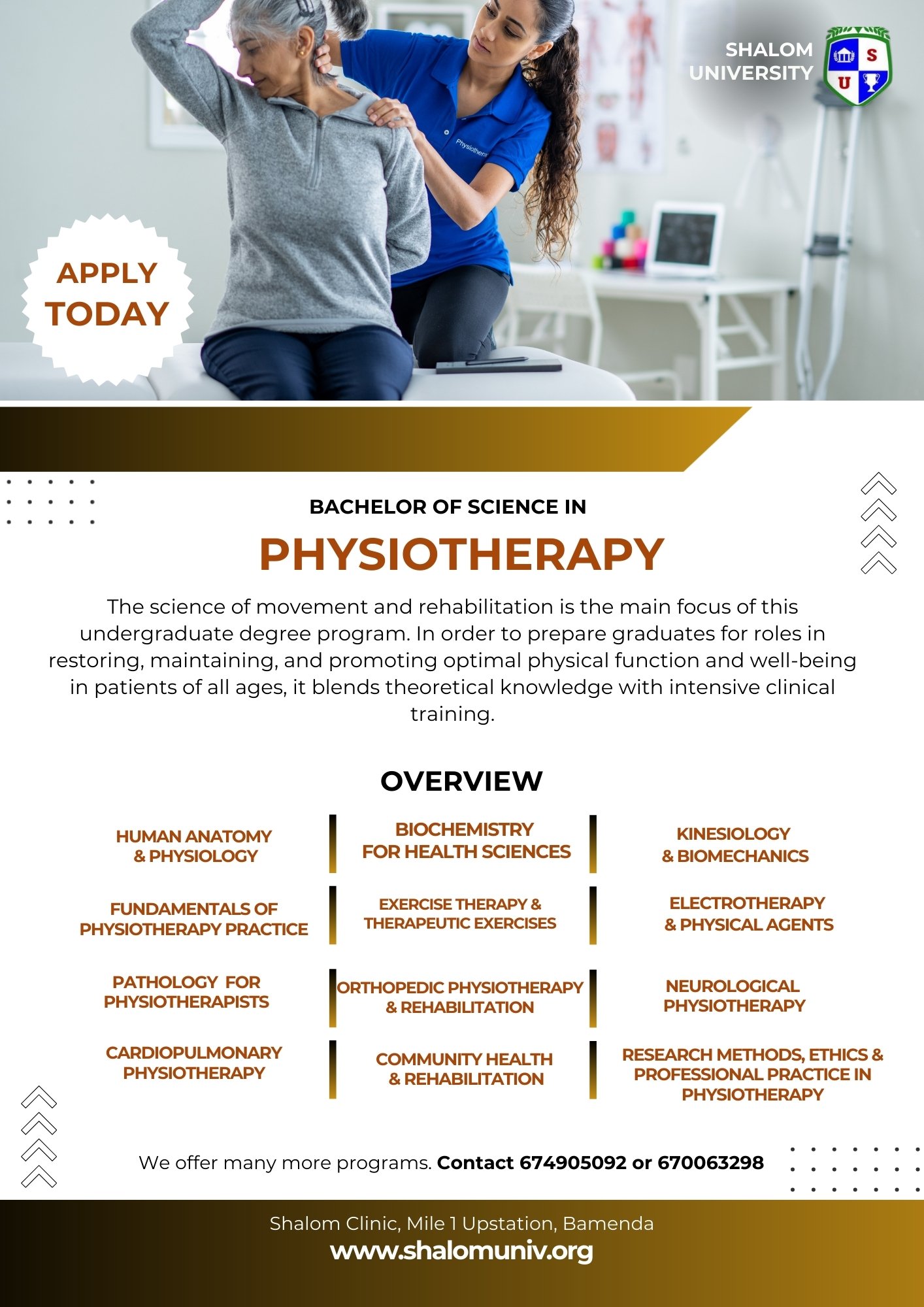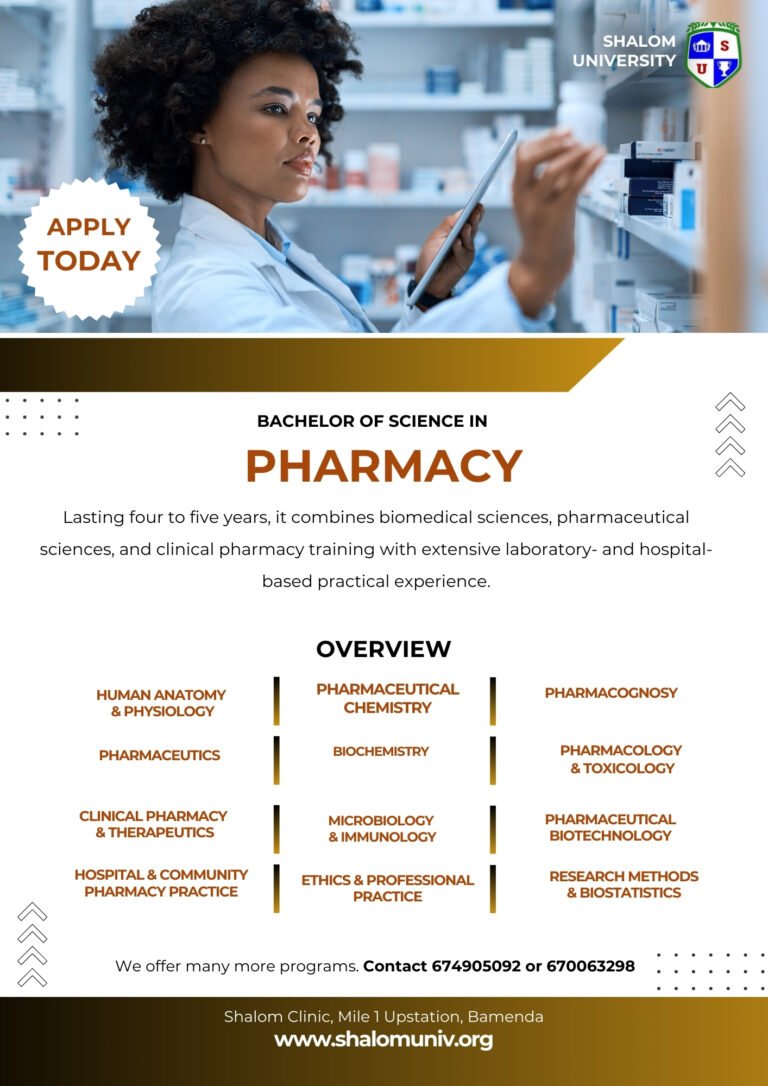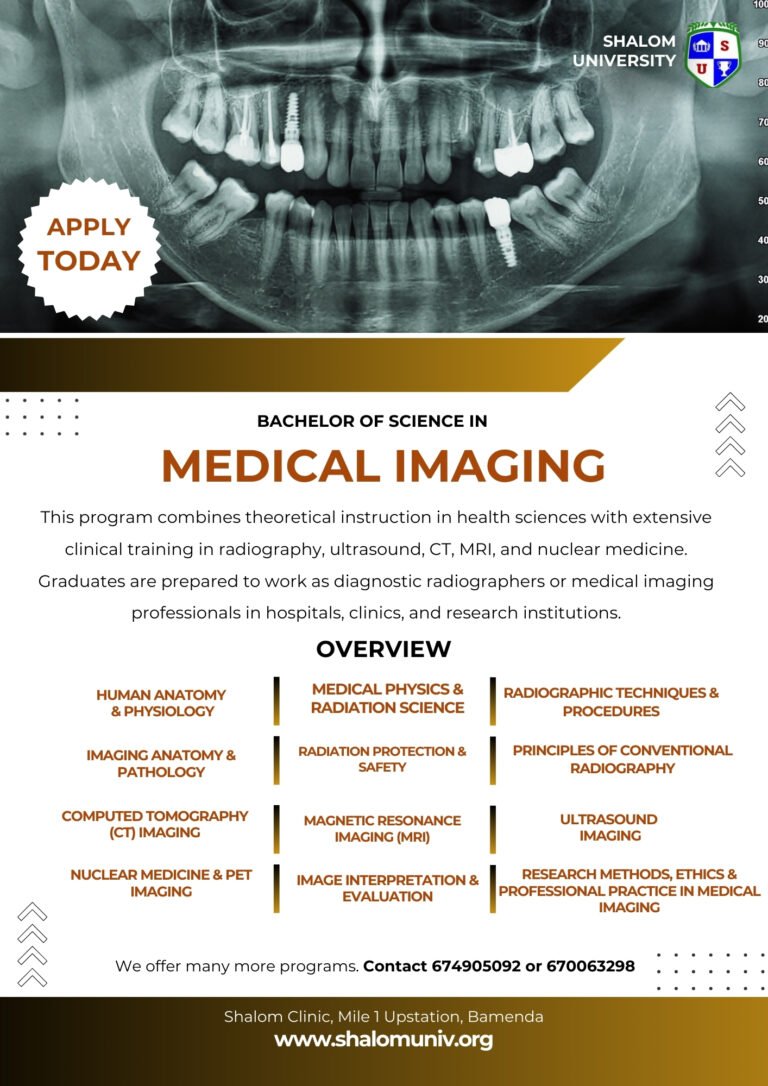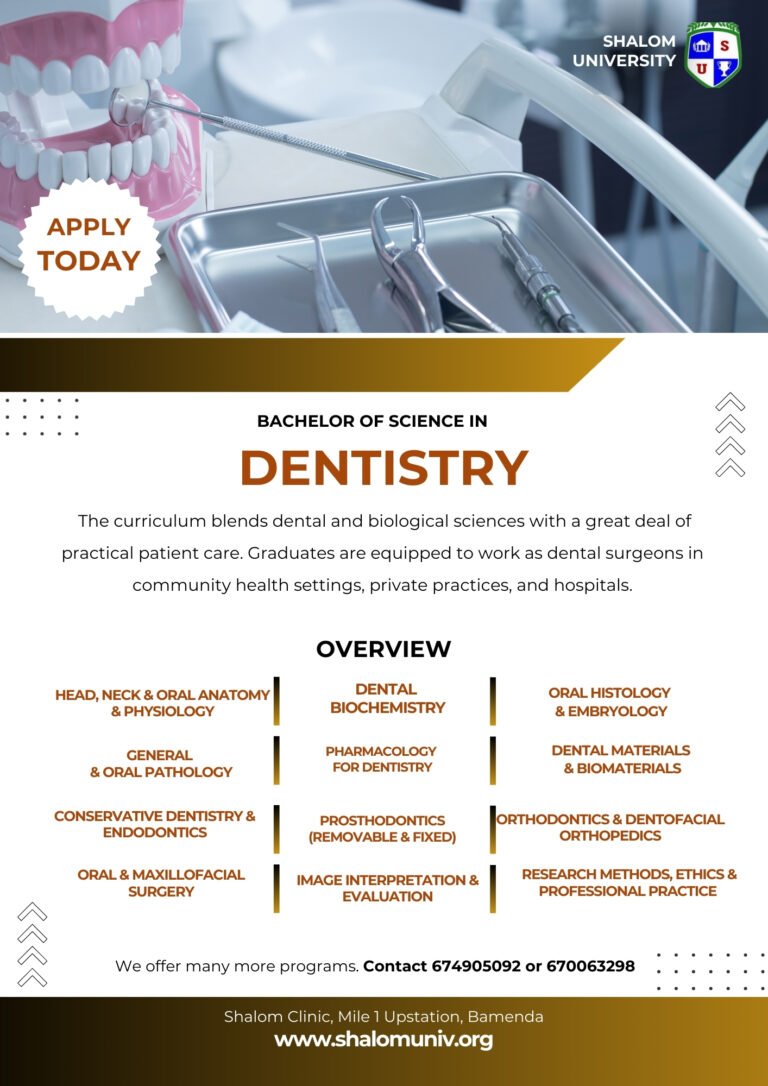Physiotherapy is one of the fastest-growing fields in healthcare, playing a vital role in restoring mobility, enhancing physical performance, and improving quality of life. From injury recovery to chronic disease management, physiotherapists help patients regain independence and live healthier lives.
The Bachelor of Science in Physiotherapy (BSc PT) at Shalom University is designed for students who want to pursue a career in rehabilitation sciences, sports medicine, community health, and clinical physiotherapy practice. This program combines classroom learning, practical lab training, and real-world clinical rotations, preparing graduates to deliver evidence-based physiotherapy care across all age groups and health conditions.
Below, we’ll break down the core courses and highlights of the program.
Human Anatomy & Physiology
Physiotherapy begins with a deep understanding of the human body. This course explores the skeletal, muscular, nervous, and cardiovascular systems, providing students with the knowledge to assess movement and function. Anatomy labs and dissections help students connect theory with hands-on practice.
Biochemistry for Health Sciences
Biochemistry equips future physiotherapists with an understanding of cellular metabolism, muscle contraction chemistry, and biochemical changes in diseases. This foundation helps explain how exercise, nutrition, and rehabilitation impact the body at the molecular level.
Kinesiology & Biomechanics
This course introduces students to the science of human motion and mechanical forces acting on the body. By studying posture, gait, and movement patterns, students learn how to design rehabilitation plans that correct imbalances and restore optimal movement.
Fundamentals of Physiotherapy Practice
Here, students are introduced to the principles, ethics, and scope of physiotherapy. They practice basic assessment techniques, patient communication, and treatment planning while learning about the history and evolving role of physiotherapists in modern healthcare.
Exercise Therapy & Therapeutic Exercises
Exercise is medicine, and this course teaches students how to prescribe individualized exercise programs to promote healing, prevent injuries, and optimize physical performance. Topics include strength training, flexibility, balance, and endurance exercises tailored to different patient populations.
Electrotherapy & Physical Agents
Electrotherapy introduces physiotherapists to modalities such as ultrasound, TENS, heat therapy, and cryotherapy. These agents are essential for managing pain, reducing inflammation, and enhancing tissue healing. Students gain both theoretical and hands-on experience with these treatment tools.
Pathology & Microbiology for Physiotherapists
Understanding disease processes is crucial for safe practice. This course covers inflammatory conditions, musculoskeletal disorders, and infections that may influence rehabilitation. Physiotherapy students also study infection prevention and control in clinical practice.
Orthopedic Physiotherapy & Rehabilitation
Orthopedic physiotherapy focuses on musculoskeletal injuries, fractures, joint replacements, and sports-related conditions. Students learn advanced manual therapy techniques, post-surgical rehabilitation, and exercise protocols to restore mobility and strength.
Neurological Physiotherapy
This course equips students to work with patients who have neurological disorders such as stroke, spinal cord injuries, multiple sclerosis, and cerebral palsy. The emphasis is on improving motor function, coordination, and independence through specialized therapies.
Cardiopulmonary Physiotherapy
Students are trained in respiratory care, cardiac rehabilitation, and pulmonary physiotherapy for patients with conditions like asthma, COPD, and post-heart surgery recovery. This area is critical in improving endurance, lung function, and cardiovascular health.
Community Health & Rehabilitation
Physiotherapy is not limited to hospitals. This course prepares students for community-based rehabilitation programs, especially in underserved populations. Students learn how to design health promotion campaigns, disability prevention strategies, and outreach services.
Research Methods, Ethics & Professional Practice in Physiotherapy
Modern physiotherapy practice is grounded in research. Students are trained in study design, biostatistics, and evidence-based practice while also learning about ethics and professionalism. This ensures graduates can contribute to scientific knowledge and maintain high standards of patient care.
Career Opportunities After BSc Physiotherapy
Graduates of Shalom University’s BSc in Physiotherapy can pursue careers as:
- Clinical physiotherapists in hospitals and rehabilitation centers.
- Sports physiotherapists for athletes and fitness professionals.
- Community rehabilitation specialists.
- Researchers in biomechanics and rehabilitation sciences.
- Educators in academic and training institutions.
The degree also serves as a pathway to postgraduate studies such as MSc in Physiotherapy or specialized programs in orthopedic, neurological, or sports rehabilitation.
Why Choose Shalom University for Physiotherapy?
- Comprehensive Curriculum covering anatomy, biomechanics, exercise therapy, and rehabilitation.
- Hands-on Training with real patients in hospitals and community settings.
- Expert Faculty blending academic excellence with clinical experience.
- Global Relevance with programs aligned to international physiotherapy standards.
- Research & Innovation fostering evidence-based practice.
For details, visit the official program page: BSc in Physiotherapy at Shalom University.
Frequently Asked Questions (FAQ)
Q1: How long is the BSc in Physiotherapy at Shalom University?
A: The program typically runs for four years, including academic coursework, lab training, and clinical placements.
Q2: What are the admission requirements?
A: Applicants should have a high school diploma with strong grades in biology, chemistry, and physics. Additional requirements may apply for international students.
Q3: Is clinical training part of the program?
A: Yes, students complete clinical rotations in hospitals and rehabilitation centers to gain hands-on patient care experience.
Q4: What careers can graduates pursue?
A: Graduates can work in hospitals, sports clinics, rehabilitation centers, research institutions, and community health programs.
Q5: Why should I choose Shalom University for physiotherapy studies?
A: Shalom University combines academic rigor, clinical exposure, community engagement, and research training, making it an excellent choice for future physiotherapists.
